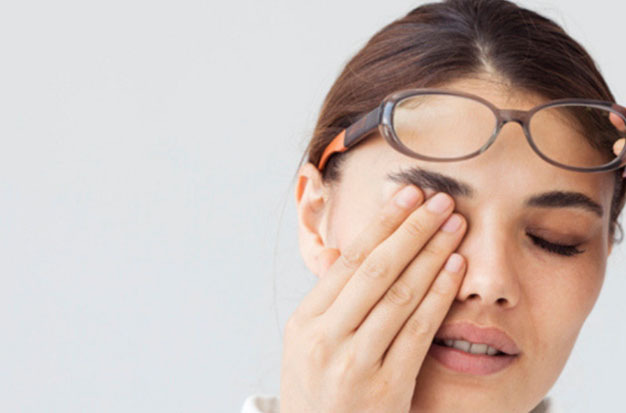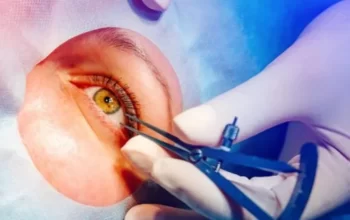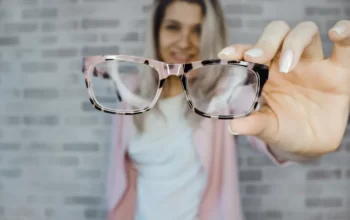
Dry eyes are a common problem at night for many people. When the body doesn’t produce enough tears to keep the eyes moist, dry eyes commonly result. Itching and vision issues can result from this condition.
Excessive screen time, dehydration, and specific medical conditions are a few of the factors that can cause an imbalance in the production and removal of tears.
Although dry eyes frequently go away on their own, there are a number of treatments and DIY remedies available for other times.
In this article, we go over some of the possible causes, typical symptoms, and remedies for dry eyes at night.
Why Do My Eyes Get Dry At Night?
Your eyes already have a natural tendency to dry out after using them all day. There are other factors, though.
The body’s metabolism changing at night is one theory. As bedtime approaches, body temperature decreases by one to two degrees, and metabolism slows while you sleep. Blood circulation slows down as a result of the sluggish body processes, and as a result, the eye receives fewer nutrients and produces fewer tears.
As was already mentioned, having dry, itchy eyes can also be caused by insufficient eyelid closure while you sleep.
Is It Dangerous To Have Dry Eyes At Night?
Chronic dry eyes can cause issues with eye health, whereas the occasional bout of dry eyes at night won’t have long-term effects. It’s best not to brush off your chronic dry eyes as a bothersome inconvenience because it can lead to blurred vision, light sensitivity and increased susceptibility to infections, scratches, and corneal abrasions.
What Leads To Dry Eyes At Night?
Three layers of tear film—fatty oils, aqueous fluid, and mucus—cover the surface of the eye. When there is an imbalance between these layers due to decreased tear production or increased tear evaporation, dry eye develops, resulting in inflammation and irritation.
Common causes for tear production problems include:
- aging (most people over the age of 65 experience some dry eye)
- hormone changes, such as pregnancy, contraception use, or menopause
- certain health conditions, such as rheumatoid arthritis, diabetes, and thyroid issues
- inflammation of eyelid glands (a condition known as blepharitis)
- certain medications
- vitamin A deficiency
- dry air, wind, or smoke
There might be other factors at work if you notice your eyes are drier at night. These may include:
- lagophthalmos at night. These individuals don’t completely close their eyelids at night. Sometimes the eyelids seem to close, but they don’t create a seal that keeps moisture inside.
- Screen time.Your blink rate decreases if you spend a lot of time using a smartphone or computer. This can result in dry eyes and eye strain, which may get worse at night after a long day at work.
- prolonged use of contact lensesThe effects of dry eye may worsen at night if contact lenses are worn all day.
Why Do Dry Eyes Get Worse At Night?
Daytime hours are when wind, smoke, and dry air all contribute to dry eyes. Are there any specific ailments that cause dry eyes at night? Yes, in actuality, and more than you might think.
Nocturnal Lagophthalmos
Your body’s inability to completely close your eyelids while you’re sleeping is known as nocturnal lagophthalmos. It is believed that facial nerve weaknesses, particularly in the seventh cranial nerve, are the main cause. Because of the increased surface area of your eye exposed to air when you sleep with your eyes partially open, it’s possible that your tears are evaporating more quickly than usual.
Nighttime Technology Hygiene
Your habit of watching Netflix while you fall asleep or scrolling through Instagram to unwind may be making your eyes dry. While staring at screens, we blink less frequently. Staring at a phone, TV, or computer for an extended period of time can cause dry eyes and eye strain both during the day and at night because blinking replenishes the lubricating layer of tears in your eyes. Read up on the effects of cell phone use on the eyes for more details.

Changes In Nighttime Metabolism
Your body’s metabolism slows down and naturally lowers its blood pressure at night. Although these significant alterations let your organs rest, they can also make your eyes dry at night because decreased organ function results in fewer tears being produced and lower blood pressure means that your eyes are receiving fewer nutrients through blood circulation.
Allergies
Allergies can also cause dry eyes, though they do so in different ways than those previously mentioned. Check your bedroom for allergens; dust, mold, laundry detergents, and allowing pets to sleep in your bed can all cause allergies.
Inadequate Sleep
not getting enough sleep? It’s possible that your eyes are experiencing discomfort along with your body. Your eyes require a break from air exposure and will benefit from it. If you stay up late watching TV or if you already have dry eyes during the day, not getting enough sleep can make them worse at night.
Air Conditioning
The love of air conditioning among Houstonians is well-founded. However, your air conditioner may be a factor in your nighttime eye dryness if it is running at full capacity and/or blowing directly in your face. Similar to how dry, cold weather can cause dry eyes during the day.
Symptoms
Dry eyes can cause a range of symptoms, including
- stinging or burning sensations in or around the eye
- redness in the eyes
- increased sensitivity to light
- blurred vision
- a scratchy or gritty feeling, as though something has become stuck in the eye
- stringy mucus around or near the eyes
- watery or watering eyes
- Pain while wearing contacts
Natural Remedies For Dry Eyes At Night
There are many over-the-counter medications that can help with dry eyes at night. Additionally, you can lessen the irritation of dry eyes at night if you address the daytime symptoms of dryness.
Start with lubricating tears, gels, and creams. Pay close attention to the instructions. A viscous eye gel that is designed to coat the eye at night is what you should use if you want to help preserve moisturizing tears. It should be used at bedtime because the thickness might obstruct vision.
A barrier, such as a sleep mask or eye seal, can help to keep moisture on the cornea if dryness is brought on by eyelids that don’t close all the way. Changes in behavior, such as cutting back on computer use right before bed, can help prevent dry eyes. Additionally, to add moisture to the air, you can install humidifiers in a number of rooms of the house, including your bedroom.
Treatments
Depending on how severe the condition is and what caused it, there are different dry eye treatments.
Some options for treatment include:
- Adding tears: OTC artificial teardrops, moisturizing ointments, and gels are options that people can try. The best options are preservative-free products with fewer potentially irritating ingredients.
- Maintaining tears: To keep natural tears in the eyes for a longer period of time, this involves blocking the tear ducts, which drain tears, with tiny gel or silicone plugs.
- Treating eye or eyelid inflammation: To treat these conditions, doctors will recommend anti-inflammatory eye drops, ointments, or washes for the eyelids.
- Increasing tear production: It is possible to produce more tears when using prescription eye drops, such as cyclosporine.
- Changing medications associated with dry eyes: A person can talk to a doctor about effective alternatives to medications that are causing dry eyes.
- Surgery to strengthen and tighten the lower eyelids: These procedures can treat nocturnal lagophthalmos or stop tears from evaporating too quickly.
When To See A Doctor?
Mild dry eye symptoms before or during sleep are typically not a cause for alarm. The signs ought to disappear without treatment.
If symptoms are severe, persistent, or do not go away with at-home care or over-the-counter medications, a person should consult a doctor about dry eyes.
Prevention Tips
You can help prevent nighttime dry eyes by taking a few easy steps.
- Use a humidifier. If your bedroom’s air is particularly dry, adding moisture may help with nighttime dry eyes.
- Screens should have less of an impact. If you spend a lot of time working in front of a computer, remember to take frequent breaks and to blink frequently. Placing your screen slightly below your field of vision also helps.
- Change your eyewear. Try wearing glasses instead of contacts if you wear them.
- Regularly wash the linens. This gets rid of allergens like pet hair and dust that could irritate your eyes.
- Stay hydrated. This aids in ensuring that your body has enough water to support tear film and function properly.
Conclusion
There are many causes of dry eyes at night. Your doctor can assist in determining the cause of your symptoms. Taking breaks from your screen, switching to glasses from contacts, and using artificial tears can all help lessen the symptoms of dry eye.
Consult your doctor if you still experience dry eyes after making these lifestyle changes. To offer long-term relief, medication may be required.
Read more about: Why Are My Eyes Dry When I Wake Up?



